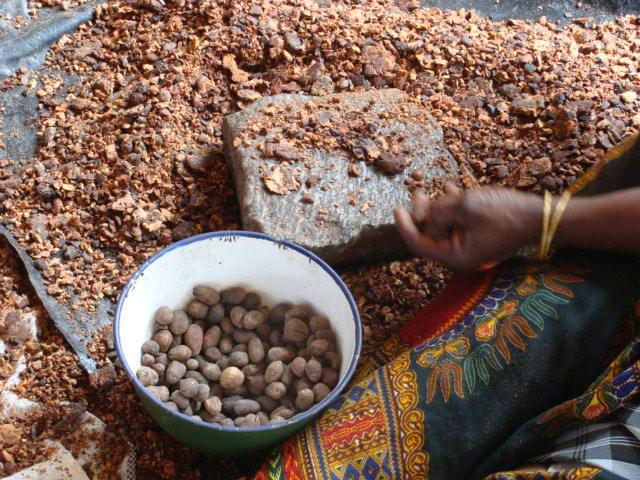- Home
- Worldwide
- CIRAD worldwide
- Projects
- BIOSTAR project
Sustainable bioenergy for small agrifood enterprises in rural areas of West Africa - BIOSTAR

The BIOSTAR project will strive to recycle the by-products generated by the sector (oil cakes, pulp and shells) as a fuel, instead of the fuelwood traditionally used, which is not renewable © J. Blin, CIRAD
Issues
In West Africa, access to energy in rural areas is often erratic, expensive and insufficient. To secure energy supplies, agrifood processing SMEs are forced to set up in city suburbs. As a result, transporting raw materials from agricultural production areas generates extra costs and results in post-harvest losses. In addition, urban concentration is increasing, at the expense of rural areas, which are struggling to develop since their activity is consequently limited to agriculture. These agrifood processing firms also generate organic waste that, if poorly managed, causes problems in terms of public health and safety and/or environmental contamination. Yet this biomass – cashew and shea nut shells, groundnut shells, mango kernels or rice husks – is a potential source of energy: heat, mechanical power and electricity.
Description
The BIOSTAR project aims to install equipment to produce bioenergy from organic waste, either on agrifood SMEs' premises or nearby. Five value chains have been identified – cashew nut, groundnut, shea nut, mango and rice – within which SMEs that have the capacity to innovate will be chosen, in collaboration with local interprofesssional organizations. A sustainable supply of waste will be a key criterion. The plan is to adapt 16 prototypes of bioenergy production equipment to the situation of each SME and have them installed by Sahelian and/or European suppliers. At the end of the project, ownership of the experimental units will be transferred to the SMEs. Lastly, a training programme will be deployed in order to develop the bioenergy sector in Sahelian Africa, thanks in particular to the involvement of local, national and sub-regional policymakers. The goal of this process is to implement a policy framework that is more conducive to this development in rural areas.
Expected impacts
- Energy self-sufficiency for SMEs, enabling them to set up near agricultural production sites, hence providing rural jobs and boosting local food security.
- More efficient agricultural value chains.
- Improved incomes for women, since shea nuts and cashew nuts for instance are primarily processed by women's groups.
- The development of the bioenergy sector in rural areas, by fostering the installation of enterprises specializing in bioenergy (equipment suppliers, infrastructure maintenance, energy service providers).
- Better environmental protection by no longer using petroleum products to produce energy and replacing them with by-products, co-products and waste from agrifood value chains.
Partners
- Five national research and academic establishments in West Africa (2iE; IRSAT; Thomas Sankara University; ISRA/BAME; Gaston Berger University, Saint-Louis-du-Sénégal),
- Three European research organizations (Catholic University of Louvain, Belgium; Institute of Agricultural Engineering, University of Hohenheim, Germany; Roma III University, Italy),
- An NGO (Nitidae).























